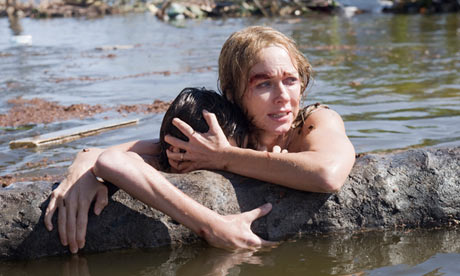
Despair, pain, panic and hope fight for supremacy in this outstandingly made and heartwrenching film, based on the true-life story of a Spanish family who went on a Christmas holiday in Thailand in 2004 and were caught up in the tsunami that hit south-east Asia, killing 230,000 people. With simplicity and conviction, it manages to be something other than a conventional disaster movie. The tsunami sequence itself is a masterly piece of film-making – and as for what follows, I have to admit to being blindsided by its real emotional power. This film is of course vulnerable to charges of manipulation, and of magnifying the western-tourist experience at the expense of the indigenous communities who lost everything. But in the end I found honesty and compassion in The Impossible. It could well be Ewan McGregor's finest hour, and there were long sections that I had to watch through a wobbly blur of tears.
It is directed by Juan Antonio Bayona and written by Sergio Sánchez, who collaborated on the excellent ghost story The Orphanage in 2007. The Spanish family has been turned into well-off Brits: Maria (Naomi Watts) and Henry (McGregor) and their three boys, Lucas (Tom Holland), Thomas (Samuel Joslin) and Simon (Oaklee Prendergast). They are a little stressed, a little smug, blandly accepting the luxury of their Thai holiday complex after a mild squabble over whether they would get exactly the beachside villa they had booked. Henry then broods over work emails on his smartphone, and Bayona and Sánchez plant a seed of doubt by making Maria's poolside reading a novel by Joseph Conrad. We don't see which, but it could be Typhoon.
Fans of The Orphanage will be on the lookout for touches of the unearthly or uncanny in the way premonitions of disaster are offered. Apart from Conrad, I could see only one: a strange, brief sequence in which we view the beach resort from the sea, as if from the point of view of that malign force about to destroy it.
The deluge itself is viscerally real and almost unwatchable. Clint Eastwood's 2010 movie Hereafter began with a similar scene, a reconstruction of the tsunami that was well made and certainly far superior to the rest of his film, on a similar subject. But Bayona's version is markedly better, created with colossal technical flair.
What The Impossible brings home is the simple agony and terror of being separated, a void which is worse than physical injury. In the chaos and devastation, the parents and children find themselves, variously, in different parts of this post-apocalyptic landscape. They wonder if their loved ones are dead, or about to be dead; they wonder if they themselves are going to die, if they would be better off dead, and if being dead is in fact what they will come to want more than anything.
Out of nowhere, McGregor delivers a performance with a sledgehammer emotional punch. Until the disaster struck, his Henry had been an identikit nice guy, a bland, somewhat self-satisfied tourist who fulfilled his parenting duties a little self-consciously. But at the low point of his despair, Henry has to borrow someone else's mobile phone and call his wife's father to tell him the situation. Simply having to enunciate what has happened overwhelms him with grief and fear, and he sounds just as much a scared little boy as any of his sons.
Watts's Maria is suffering her own torment in hospital, almost unconscious with a badly injured leg: Lucas – in a very decent performance from Holland – is anxiously watching over his mother, terrified that he will be separated from her, but at last takes a break and wanders around the hospital on a self-imposed mission to re-unite strangers with their lost children or partners. His altruism is rewarded with success, but then punished by a horribly ironic twist of fate.
And so The Impossible carries on, with some uncompromisingly big lachrymose moments and near-miss suspense scenes. The overhead shot showing dead bodies laid out with military organisation and precision nowhere visible in the shattered world of the living is a shock. This film is not especially complex, and not subtle, but there is judgment and intelligence in the simple idea of survival being the most agonising thing, and making survivor guilt the psychological aftershock of a shattering and irreparable blow.

